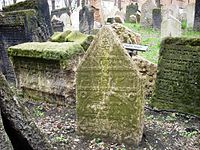- David Gans
-
For the rock musician and music journalist, see David Gans (musician).
David Gans (David ben Shlomo Gans) 
Tombstone of David Gans in PragueBorn 1541
LippstadtDied 25 August 1613
PragueResting place Old Jewish Cemetery of Prague, Josefov, Prague Religion Judaism Parents Shlomo ben Seligman David ben Solomon (Shlomo) ben Seligman Gans (German: David ben Salomon ben Seligmann Gans; also Ganz; Hebrew: דָּוִד בֶּן שְׁלֹמֹה גנז; 1541, Lippstadt - 25 August 1613, Prague) was a Jewish mathematician, historian, astronomer, astrologer, and is best known for the works Tzemach David (1592) and Nechmad ve'naim.
Early life
He was born in Lippstadt, in what is now North Rhine-Westphalia, Germany, where his family were moneylenders. He studied rabbinical literature in Bonn and Frankfurt am Main, then in Kraków where he studied under Moses Isserles.
Later he attended the lectures of the Maharal of Prague and of his brother, R. Sinai. They introduced philosophy, mathematics, and astronomy into the circle of their studies, and from them Gans received the impulse to devote himself to these branches of science. He lived for a time at Nordheim (where he studied Euclid), passed several years in his native city of Lippstadt, and then in about 1564 settled at Prague. There he came into contact with Kepler and Tycho Brahe, and took part for three consecutive days in astronomical observations at the Prague observatory. He also carried on a scientific correspondence with Johann Müller (Regiomontanus), and was charged by Tycho Brahe with the translation of the Alfonsine Tables from Hebrew into German.
His History
Among Gans's works the most widely known is his history entitled Tzemach David, published first at Prague, in 1592. It is divided into two parts, the first containing the annals of Jewish history, the second those of general history. The author consulted for the second part of his work the writings of Spangenberg, Laurentius Faustus, Hubertus Holtzius, Georg Cassino, and Martin Borisk. Though Gans's annals are very dry and have no great intrinsic value, they are memorable as the first work of this kind among the German Jews, who at that time appreciated historical knowledge but slightly. Indeed, in his preface to the second volume the author deemed it necessary to justify himself for having dealt with so profane a subject as the annals ofgeneral history, and endeavored to demonstrate that it was permitted to read history on Saturdays. The Tzemach David passed through many editions. To the edition of Frankfort-on-the-Main, 1692, David ben Moses Rheindorf added a third part containing the annals of that century, which addition has been retained in later editions of the Tzemach. The first part of Gans's work, and extracts from the second, were translated into Latin by Wilhelm Heinrich Vorst (Leyden, 1644). It was translated also into Judæo-German by Solomon Hanau (Frankfort-on-the-Main, 1692).
Gans was also the author of: Gebulat ha-Eretz, a work on cosmography, which is in all probability identical with the Zurat ha-Eretz, published at Constantinople under the name of "David Abzi" ("Auza" = = "Gans"); Magen David, an astronomical treatise, a part of which is included in the Nechmad ve'naim mentioned below; the mathematical works Ma'or ha-Ḳatan, Migdal David, and Prozdor, which are no longer in existence; Nechmad ve'naim. dealing with astronomy and mathematical geography, published with additions by Joel ben Jekuthiel of Glogau at Jessnitz, 1743. This work is divided into 12 chapters and 305 paragraphs. In the introduction the author gives a historical survey of the development of astronomy and mathematical geography among the nations. Although acquainted with the work of Copernicus, Gans followed the Ptolemaic system, attributing the Copernican system to the Pythagoreans. He also ventures to assert that the prophet Daniel made a mistake in computation. A Latin translation of the introduction, and a résumé made by Hebenstreit, are appended to the Nechmad ve'naim.
Death
His grave is in Prague, is marked with a "Magen David" and a goose (German: Gans meaning goose in German).
References
- This article incorporates text from the 1901–1906 Jewish Encyclopedia article "Gans, David" by Joseph Jacobs, Isaac Broydé, a publication now in the public domain.
Jewish Encyclopedia bibliography
- Zunz, Gesammelte Schriften, i. 185;
- D. Cassel, in Ersch and Gruber's Encyklopädie, xliii. 367;
- Steinschneider, Jew. Lit. p. 262;
- idem. Cat. Bodl. col. 860;
- Grätz, Gesch. der Juden, 3d ed., ix. 442;
- Hock-Lieben, Prager Grabstein Inschriften;
- Allgemeine Deutsche Biographie, s.v.;
- Stössel, in Löw's Ben Chananja, viii. 601;
- Brüll, ib. p. 710
External links
See also: Gans (surname) and GanzCategories:- 1541 births
- 1613 deaths
- People from Lippstadt
- German Jews
- 16th-century astrologers
- 16th-century astronomers
- 16th-century Czech people
- 16th-century geographers
- 16th-century German people
- 16th-century historians
- 16th-century mathematicians
- 16th-century scientists
- 16th-century theologians
- Czech astrologers
- Czech astronomers
- Czech geographers
- Czech historians
- Czech Jews
- Czech mathematicians
- Czech theologians
- Czech people of German descent
- German astrologers
- German astronomers
- German expatriates in Poland
- German expatriates in the Czech lands
- German geographers
- German historians
- German mathematicians
- German theologians
- Jewish astrologers
- Jewish historians
- Jewish scientists
- Jewish theologians
- People from Prague
- Jewish history stubs
- German academic biography stubs
- Czech people stubs
- European academic biography stubs
Wikimedia Foundation. 2010.

